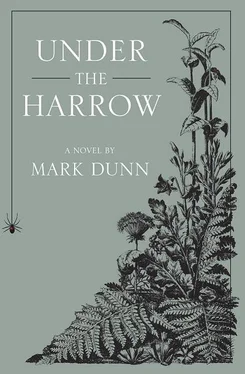I could sit and nod and only privately repine the interview until my much-anticipated withdrawal be effected, or I could defend my friend Mulberry Timberry who did not deserve to be depreciated by the chairman of the Medical Review Board simply on the basis of his youth and present inexperience.
“And what a ridiculous name it is: Mulberry Timberry!” Sir Dabber appended in exclamation, after taking a sneeze from application of the snuff. “Two berries in the same name. Were his parents daft?”
I knew his parents well. They were not in the least bit daft, though their sense of the comical sometimes led them to inject jollity into places in which it wasn’t generally to be found. Even to this day, I could be no better cheered upon occasions of despondency than by a visit to that harlequin house. Charles Timberry and his wife Julia were also puppeteers who in itinerant fashion strolled the lanes of Dingley Dell and here and there put on Punch and Judy entertainments for the children — and a good many child-hearted adults — when they were not pulling upon the udders of their lady Guernseys both to fill the pails for their dairy customers and to spray foamy teatmilk into the faces of one another in mischievous divertissement.
“Daffy, yes, Sir Dabber, but daft, I should say not. Now, if there is nothing else that you require of me, I must be off.”
“As it so happens, Trimmers, there is something that I require of you. Will you stay for tea? I have cake.”
I could not help rolling my eyes in annoyance, happy that my back was turned to the importuning gentleman and that I was nowhere near the large pier glass that would have afforded him a look at my reflected disrespect.
“I’ll stop for a bit longer then, Sir Dabber, but cannot delay for too long my other appointments.”
Dabber smiled. “Other appointments? Do you not sit hunched over your little writing desk above Mrs. Lumbey’s dress shop all the day long and scribble away as would some Bedlam obsessitor? Can you not delay a return to your chicken-scratching for two hours more? Come now.”
“Still, there are things I must—” I broke off and heaved a noiseless sigh. “Well, there is nothing too pressing to which I should attend, I suppose.”
I was got.
“Excellent! Sit, sit. Arabella! Where is the teaboard? What detains you, girl?”
The aforementioned Arabella flew into the room at the clarion mention of her name, all the tea things upon the tray rattling and clattering from her jostling carriage. I could only presume that Arabella, who had been in service to Sir Dabber for at least the last five years, was paid quite well for being so brashly ordered about, servants in Dingley Dell who did not come untrained and unseasoned from Blackheath constituting a precious commodity as labourers who could, in most cases, do a great many other things for a florin that did not require demeaning obsequiousness and self-abnegation.
Dabber kept quiet until the tea had been poured and the cake cut and portioned. Following the young woman’s hasty departure, pursuant to a stern and dismissive look on the part of the master of the house, Sir Dabber (the Sir being affixed to his surname for no reason but personal whimsy) looked at me with an earnest aspect and said in a sober and even tone, “You know of my child — my little Bevan — Good God! He isn’t so little anymore, now is he? He must by now have attained his twentieth year. The boy — I must call him such, for I cannot think him ever a man with a brain that does not cerebrate beyond that of a low monkey upon his very best days — receives a visit by me once a quarter. I take him sweetbreads and other tasty things for his nonetheless rather undiscerning palate and I sit and hold his hand and sometimes I hum to him to draw out a smile. Well, it is time again for a visit — overdue, in fact, but I’m having difficulty finding the resolve to betake myself to that dreary place. I know that I must — it is a father’s bounden duty to see his child at least four times a year, even if that child be imbecile and wholly incoherent.”
“Are you nevertheless asking that I go in your place, Sir Dabber?”
“Upon my word, I am not! I am merely seeking your company for the duration of the excursion. For I will endure the visit much more comfortably with a companion standing at my side who will draw my son’s eye, so that he doesn’t stare at me vacantly and sometimes drool and drivel as if I am a leg of roast mutton that will anon be his to gnaw and savour.”
“Is there no one else whom you might ask? I have no history with the boy. He will wonder at my presence.”
“He’ll wonder at nothing of the sort, for his lizard brain doesn’t wonder at anything but what he will eat and where he will lay his head to sleep. He’s an automaton of a sort, a kind of unhuman thing with which I have been saddled and plagued for all of the last ten years for doing nothing more terrible than siring him and giving him my surname. I would weep over the injustice of it all, had I any tears left to shed.”
“Have you—” I faultered, for the question was harsh, “have you, Sir Dabber, no love left for the boy? Has all compassion for the young man and his plight taken its leave?”
Rather than taking offence at the question, Dabber dropt his head and willingly nodded, the shame in the admission reducing the gentleman to silent self-debasement. After a quiet interval, he delivered through a wheeze, “I once loved Bevan, but it was all squandered affection, as if one were cuddling and dandling a stone. I have endured his society, but now it exacts a heavy price from me. I wish sometimes that he should simply die. On occasion…” And here the large, lugubrious man’s admission took on a still more confiding tone, “I even pray for it.”
I did not judge Sir Dabber’s motives. Should I have found myself in identical circumstances, could I not have felt the very same? Yet the hospitalised young man was still a human being who deserved a tender hand whether his brain be akin to that of low primate or lizard or stone. Bevan Dabber deserved compassion from his father. But the father deserved clemency from me as well. I would not wish to trade places with him for worlds. Perhaps time had hardened him to his son’s condition; I would not excuse it, but I couldn’t fully deprecate his position. At all events, I would be unable to escape the commission that had been given me (for no temporisation on my part would have been believed) and so I agreed to go with the father and to sit next to him as he in turn sat beside his only child, the young man of twenty who bore his surname and resembled him slightly in the chin and in the eyes. He would hold that young man’s cold hand (for cells within Bedlam were drafty, frigid places) and speak to him in those dulcet tones that calm and soothe the breast.
For there was nobody else to do it. Sir Dabber had only one friend, and apparently (to my surprise) it was I.
“When do we go?”
“This afternoon. Visitation, as you know, is permitted only on the first Wednesday and third Sunday of the month. If we miss this opportunity, two-and-a-half weeks must pass, and I’ll feel dreadfully guilty for every day that intervenes.”
Chapter the Twenty-eighth. Wednesday, July 2, 2003
 t was not my habit to visit Bedlam. It was a stark and forbidding place that was best avoided if there be no compelling reason to betake oneself there. Yet however one felt about it, one could not help noting its rather intriguing architectural design, the Georgian style being quite the anomaly in this valley of mean fairy tale cottages of Tudor crisscrosses and a rather vague attempt at the Romanesque as evinced by some of our larger houses and public buildings (but without the heavy and more ponderous masonry that marked that style). This being said, the mansion house, which had been years ago converted to hospital, offered none of the lightness and eye-pleasing symmetry representative of the Georgian ideal. First, the roof had been lopped off in sugarloaf fashion to give the building a Mansard-like topping that mocked the Georgian elements. And with the construction of an appendage in 1925, which was designated the “West Wing,” Bethlehem Hospital upon Highbury Fields was forever thereafter in want of symmetry. Its extravagance of windows gave the building the look of some hard-angled creature with twenty too many eyes, who gazed ominously when he gazed at all, for a good many of his portals had long been shuttered in permanence against the harsh, exposing sun. Nor did the grounds offer respite from the grim austerity of perpetual twilight, the asylum’s garden and courtyard being canopied by oppressive boughs that overhung its paths and darkened the prevailing mood as much outside as within that severe and dismal edifice.
t was not my habit to visit Bedlam. It was a stark and forbidding place that was best avoided if there be no compelling reason to betake oneself there. Yet however one felt about it, one could not help noting its rather intriguing architectural design, the Georgian style being quite the anomaly in this valley of mean fairy tale cottages of Tudor crisscrosses and a rather vague attempt at the Romanesque as evinced by some of our larger houses and public buildings (but without the heavy and more ponderous masonry that marked that style). This being said, the mansion house, which had been years ago converted to hospital, offered none of the lightness and eye-pleasing symmetry representative of the Georgian ideal. First, the roof had been lopped off in sugarloaf fashion to give the building a Mansard-like topping that mocked the Georgian elements. And with the construction of an appendage in 1925, which was designated the “West Wing,” Bethlehem Hospital upon Highbury Fields was forever thereafter in want of symmetry. Its extravagance of windows gave the building the look of some hard-angled creature with twenty too many eyes, who gazed ominously when he gazed at all, for a good many of his portals had long been shuttered in permanence against the harsh, exposing sun. Nor did the grounds offer respite from the grim austerity of perpetual twilight, the asylum’s garden and courtyard being canopied by oppressive boughs that overhung its paths and darkened the prevailing mood as much outside as within that severe and dismal edifice.
Читать дальше

 t was not my habit to visit Bedlam. It was a stark and forbidding place that was best avoided if there be no compelling reason to betake oneself there. Yet however one felt about it, one could not help noting its rather intriguing architectural design, the Georgian style being quite the anomaly in this valley of mean fairy tale cottages of Tudor crisscrosses and a rather vague attempt at the Romanesque as evinced by some of our larger houses and public buildings (but without the heavy and more ponderous masonry that marked that style). This being said, the mansion house, which had been years ago converted to hospital, offered none of the lightness and eye-pleasing symmetry representative of the Georgian ideal. First, the roof had been lopped off in sugarloaf fashion to give the building a Mansard-like topping that mocked the Georgian elements. And with the construction of an appendage in 1925, which was designated the “West Wing,” Bethlehem Hospital upon Highbury Fields was forever thereafter in want of symmetry. Its extravagance of windows gave the building the look of some hard-angled creature with twenty too many eyes, who gazed ominously when he gazed at all, for a good many of his portals had long been shuttered in permanence against the harsh, exposing sun. Nor did the grounds offer respite from the grim austerity of perpetual twilight, the asylum’s garden and courtyard being canopied by oppressive boughs that overhung its paths and darkened the prevailing mood as much outside as within that severe and dismal edifice.
t was not my habit to visit Bedlam. It was a stark and forbidding place that was best avoided if there be no compelling reason to betake oneself there. Yet however one felt about it, one could not help noting its rather intriguing architectural design, the Georgian style being quite the anomaly in this valley of mean fairy tale cottages of Tudor crisscrosses and a rather vague attempt at the Romanesque as evinced by some of our larger houses and public buildings (but without the heavy and more ponderous masonry that marked that style). This being said, the mansion house, which had been years ago converted to hospital, offered none of the lightness and eye-pleasing symmetry representative of the Georgian ideal. First, the roof had been lopped off in sugarloaf fashion to give the building a Mansard-like topping that mocked the Georgian elements. And with the construction of an appendage in 1925, which was designated the “West Wing,” Bethlehem Hospital upon Highbury Fields was forever thereafter in want of symmetry. Its extravagance of windows gave the building the look of some hard-angled creature with twenty too many eyes, who gazed ominously when he gazed at all, for a good many of his portals had long been shuttered in permanence against the harsh, exposing sun. Nor did the grounds offer respite from the grim austerity of perpetual twilight, the asylum’s garden and courtyard being canopied by oppressive boughs that overhung its paths and darkened the prevailing mood as much outside as within that severe and dismal edifice.










